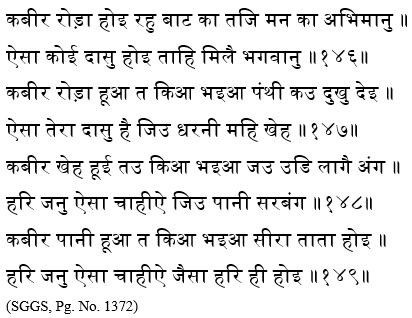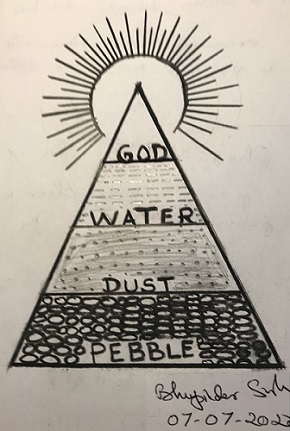Jan 07, 2026
Jan 07, 2026

Translation
Kabir! Let yourself be a pebble on the path;
abandon your egotistical pride.
Such a humble servant
shall meet the Lord God. 146.
Kabir, what good it is, to be a pebble?
It would only hurt the traveler on the path.
Your servant, O Lord, should be
like the dust of the earth. 147.
Kabir, what then, if one could become dust?
It is blown up by the wind, and sticks to the body.
The humble servant of the Lord should
be like water, which cleans everything. 148.
Kabir, what then, if one could become water?
It becomes cold, then hot.
The humble servant of the Lord
should be just like the Lord. 149.
My Understanding
 These are four interconnected dohas /saloks by Kabir Ji, where we can see the thoughts are getting subtler and subtler in search of epitome of humility. Kabir Ji offers an interesting cascading pyramid paradigm to define zenith of humility. He starts with the metaphor of a pebble, which is used to pave the pathway. Everybody walking over the pathway or pavement is stepping on it and pebbles don’t complain or express anguish. The pebble has offered itself fully; it is serving mankind without discriminating, who walks over it. It patiently endures the trampling by the travelers without any grudge or lament. Kabir Ji says become humble like a pebble, by offering yourself fully and completely, abandoning ego to meet God. Kabir Ji is thinking becoming servant of God, to be with God.
These are four interconnected dohas /saloks by Kabir Ji, where we can see the thoughts are getting subtler and subtler in search of epitome of humility. Kabir Ji offers an interesting cascading pyramid paradigm to define zenith of humility. He starts with the metaphor of a pebble, which is used to pave the pathway. Everybody walking over the pathway or pavement is stepping on it and pebbles don’t complain or express anguish. The pebble has offered itself fully; it is serving mankind without discriminating, who walks over it. It patiently endures the trampling by the travelers without any grudge or lament. Kabir Ji says become humble like a pebble, by offering yourself fully and completely, abandoning ego to meet God. Kabir Ji is thinking becoming servant of God, to be with God.
Suddenly Kabir Ji has a second thought after making the bold declaration. The hesitation stems from the observation of sharp edges and rough surfaces which can cause injury or wounds, when someone stumbles and falls. Kabir Ji is not appreciative of that quality in pebbles, so after making that statement he corrects himself. He feels that the pebble is not humble enough, so instead of pebbles he suggests dust as a more suitable candidate.
Dust is just the powdered pebble, in becoming dust it has even given up its earlier capacity to hurt with its sharp edges and corners. Kabir Ji was hoping that shortcoming to hurt and injure has been fully taken care of. He expects God’s servant can only be such, that it cannot cause injury. Then he realizes that it is still not humble enough, as it can be blown away by wind and be air-borne. Once air-borne, it sticks to the bodies and clothes of those walking over it, soiling them. So, Kabir Ji concludes that even dust is not humble enough to be servant of God and he has to look for a more appropriate metaphor.
Next, Kabir Ji thinks of water as the suitable metaphor for humility. Because, water is the medium used for cleaning the bodies and clothes and getting rid of dirt. He opines the water as the universal cleaner, offers that lofty potential. Water, is used to wash off dust from the body, objects and clothes, but does not get polluted by it. Dust settles at the bottom of still water and water above is clean again. Additionally, water has the unique quality of accepting the shape of the container it is poured in. It always completely surrenders itself readily adapting the shape of the vessel it is poured into. Thus, it is very accommodating, and accepting of all without a question or discrimination. It also has a unique quality of always flowing downwards; i.e. sign of humility.
Kabir Ji feels that dust, is like ignorance which clings to the mind, clouding rationality and clarity of thought. Humility is just like water that can wash that dirt of ego off, making mind thought process crystal clear.
However, after making the statement, Kabir Ji still feels that even becoming like water is not humble enough. Because it is still affected by temperature, becoming hot (as steam) or cold (chilled to become ice) depending on the external instigator source. Both steam and ice can still inflict damage or harm others. So he even discards the metaphor of water as an embodiment of humility and finally settles for God Himself. His concluding line says it all; “A devotee has to become humble like God Himself.”
Kabir Ji’s conclusion is that God is the most humble and there should not be any distinction left between the devotee and God. The conclusion Kabir Ji makes is that God is the pinnacle of humility, and our human’s aspirations should be to become humble like Him. Now if this is the benchmark that Kabir Ji has set, the question arises has he achieved that lofty pinnacle himself? The answer provided by Kabir Ji is yes and it is in his own writings. By giving the examples and setting the bar Kabir Ji wants us to develop our humility.
July 7, 2020
The English translation of the dohas (couplets) has purposely been done in four lines, for better readability.